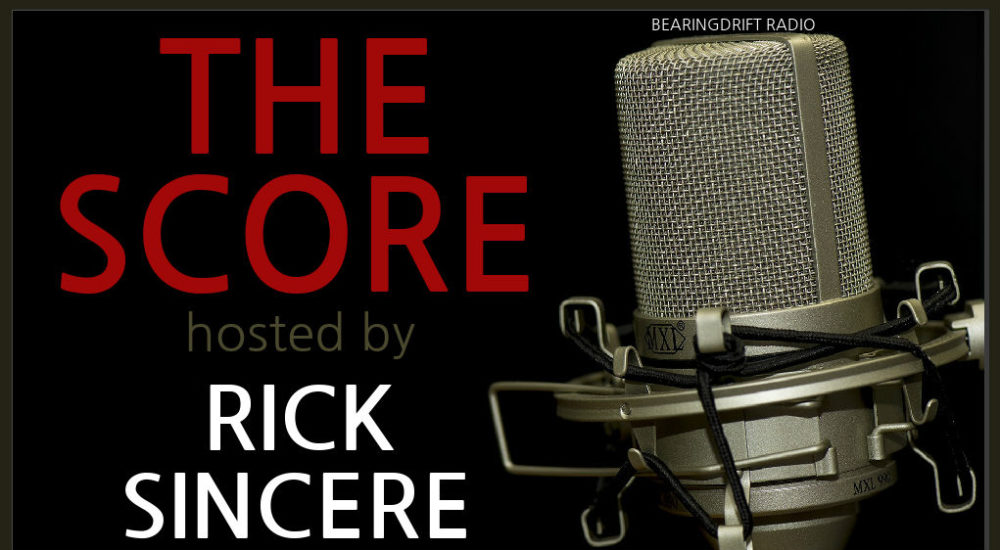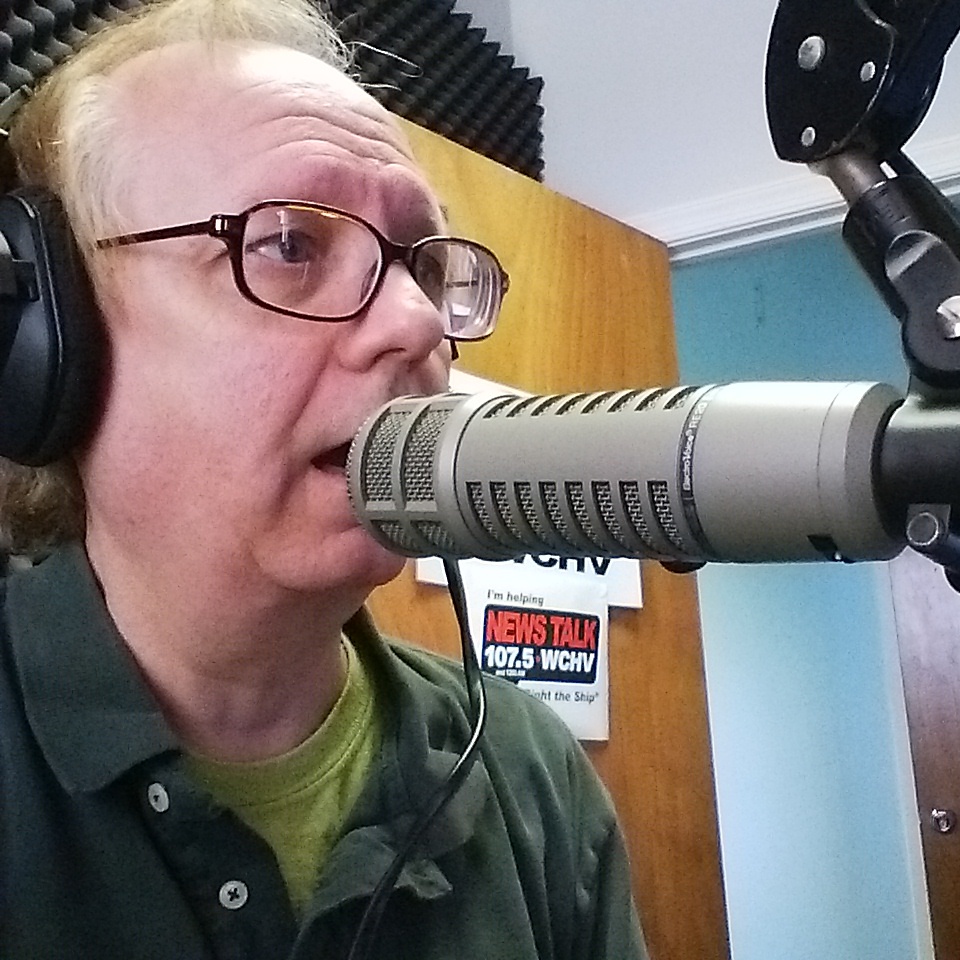The Score: Democracy Initiative, Writing Speeches, Cyber Warfare, Impeachment Revisited, Bill Clinton
This week on The Score – What can we learn from the Presidential Ideas Festival? Is democracy vulnerable to cyber attacks from our adversaries? How do presidential speech writers write presidential speeches? Should we be thinking about impeachment? All that plus former President Bill Clinton’s speech at UVA.
PrezFest
This past week, the University of Virginia hosted the Presidential Ideas Festival, a component of a new Democracy Initiative. “PrezFest” is a project of the Miller Center for Public Affairs, which intends to mount festivals like this one every two years in the future.
The Festival featured three days of panel discussions with speakers ranging from former Secretary of State Madeleine Albright and National Security Advisor Stephen Hadley to former White House advisors Karl Rove and Peter Wehner, plus journalists (and UVA alumni) John Dickerson and Margaret Brennan. The array of panelists was drawn from the Carter, Reagan, Bush 41, Clinton, Bush 43, and Obama administrations, as well as from the news media and from various academic disciplines and universities.
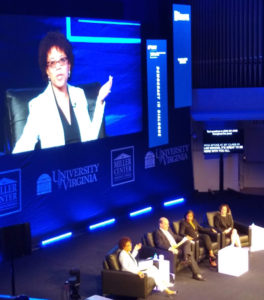 The “keynote conversations” on each of the festival’s three days were staged at Old Cabell Hall, with overflow rooms in other buildings on Grounds where people could watch on TV screens. Lunchtime breakout sessions in Newcomb Hall gave audience members better opportunities to engage with speakers one-to-one. Most of the proceedings were livestreamed on the web site of Radio IQ.
The “keynote conversations” on each of the festival’s three days were staged at Old Cabell Hall, with overflow rooms in other buildings on Grounds where people could watch on TV screens. Lunchtime breakout sessions in Newcomb Hall gave audience members better opportunities to engage with speakers one-to-one. Most of the proceedings were livestreamed on the web site of Radio IQ.
One of the organizers of PrezFest was Melody Barnes, a codirector of the Democracy Initiative who has previously been a guest on The Score. I took her aside after one of the panel discussions to ask her what the aims of the Democracy Initiative are and how it is organized.
One of the things that we’re doing is that we are supporting research laboratories that involve faculty as well as graduate and undergraduate students working in collaboration with public policy experts, and with those from the business community, philanthropy and other actors that help shape the agenda on democracy. Those research labs will study issues over the course of three years. So, for example, we have one lab up and running already that’s focused on issues of corruption and democratic institutions. We have another one that we are about to launch that will focus on authoritarianism, and what that looks like globally, but also how it affects the way that we practice democracy in the United States. Those labs will not only delve into deep scholarly research, but they’ll also focus on ways to engage with the public. They’ll also focus on ways that they can shape a public policy agenda.
The Democracy Initiative is on Twitter as @UVADemocracy; Melody Barnes tweets from @MelodyCBarnes. She previously appeared on The Score in January 2019.
Presidential Speechwriting
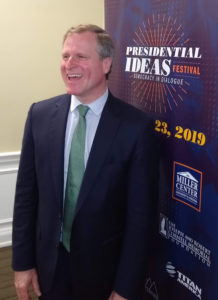 The Presidential Ideas Festival also included a couple of panels featuring presidential speech writers. A Thursday breakout session called “Translating presidential ideas into words: Speechwriters in the White House” included former Obama speech writers Sarada Peri and Kyle O’Connor and former George W. Bush speech writer John McConnell, who answered my questions about the process of speech writing and how to prepare for that kind of job.
The Presidential Ideas Festival also included a couple of panels featuring presidential speech writers. A Thursday breakout session called “Translating presidential ideas into words: Speechwriters in the White House” included former Obama speech writers Sarada Peri and Kyle O’Connor and former George W. Bush speech writer John McConnell, who answered my questions about the process of speech writing and how to prepare for that kind of job.
Tuesday’s lunchtime breakout featured Mark Katz, who helped President Bill Clinton add humor to his speeches for occasions like the White House Correspondents Dinner and events hosted by the Alfalfa Club and Gridiron Club. You may have heard Katz tell the story of one speech that went awry on The MOTH Radio Hour. I wanted to find out how humor is used in presidential speeches and the challenges that poses to a writer.
My takeaway from talking to Katz is that humor, as a communication device, is a two-way street. It tells you something about the audience (based on its reaction) and something about the speaker.
McConnell pointed to a standard set by President Ronald Reagan:
The first rule of Ronald Reagan speeches, in my opinion, was assume an intelligent listener. When I was a boy, I heard [Reagan’s] inaugural address — and I was a big Reagan fan; I listened to him on the campaign trail. And then he gave his inaugural address and I thought, “Wait a minute. He sounds exactly like he did on the campaign trail!” I thought Ronald Reagan was going to sound completely different because he’s president now. But, of course, you look back from the distance of almost 40 years ago, that was one of the best of all inaugural addresses, because it was so straightforward conversation. He assumed an intelligent listener and didn’t strive for complex oratory or anything like that. But by the same token, it wasn’t full of of baby talk or oversimplification but just clear, direct, for the intelligent interesting listener. That was always my ideal.
Mark Katz is on Twitter as @MarkKatz. John McConnell tweets from @JohnPMcConnell.
Cyber Warfare
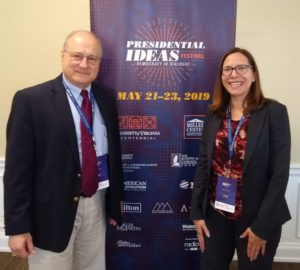 The infiltration of social media and American electoral systems by foreign adversaries was the subject of a breakout session on Wednesday. I spoke to two of the panelists afterward, Laura Rosenberger, director of the Alliance for Securing Democracy at the German Marshall Fund of the United States, and Eric S. Edelman, former Under Secretary of Defense for Policy and U.S. Ambassador to both Finland and Turkey.
The infiltration of social media and American electoral systems by foreign adversaries was the subject of a breakout session on Wednesday. I spoke to two of the panelists afterward, Laura Rosenberger, director of the Alliance for Securing Democracy at the German Marshall Fund of the United States, and Eric S. Edelman, former Under Secretary of Defense for Policy and U.S. Ambassador to both Finland and Turkey.
I asked Rosenberger what motivates the governments of Russia and China to interfere in elections in the United States and other Western democracies.
If we’re talking about Vladimir Putin’s Russia, Putin’s real goal is power. I mean, he wants to stay in power, maintain power and that means protecting his wealth, protecting those around him. But Russia is actually declining power. It’s objectively weakening economically and on other measures. And so it’s really only through weakening others that Russia can gain power on a relative basis on the world stage. Putin (you know he’s a former KGB guy) he’s talked about how the downfall the Soviet Union was one of the greatest tragedies in modern history. He sees restoring Russia to its rightful place on the world stage is a way for him to also fortify his power nationally.
Edelman spoke about goals and tactics:
The goal is the easy part. They’re interested in sowing division and casting doubt on the legitimacy of American democracy and putting us in a position where it is harder for us to criticize the defects of Russian or Chinese democracy, or the legitimacy of their actions around the world, be it in Crimea or eastern Ukraine or the South China Sea, or what have you. The tactics that they’re using are fake social media accounts (bots), to try and reinforce messages that they see being generated by others that they think are useful to their goal of sowing division and creating turmoil in American society — violence, if they can.
And they’ve been more effective I think that a lot of us would like to admit.
You can find Laura Rosenberger on Twitter at @rosenbergerlm. Eric Edelman began his PrezFest remarks by noting that he has no social media accounts of any kind, an admission met with chuckles from the audience.
Revisiting Impeachment
While the Presidential Ideas Festival covered a wide range of issues related to the presidency, there were only a few instances when speakers broached the topic of presidential impeachment.
But impeachment has been in the news this week, so I thought it might be worthwhile to revisit The Score’s interview from last October with the Cato Institute’s Gene Healy, who had written a white paper on impeachment’s history and practice.
Bill Clinton at UVA
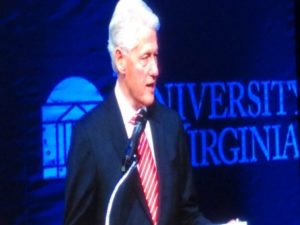 One of the biggest draws at the Presidential Ideas Festival was the conference’s closing speaker, former President Bill Clinton, who spoke for more than an hour in what was more a history lesson than any sort of partisan rallying cry. He offered a tour d’horizon of presidential actions and defects, accomplishments and failures (even some of his own).
One of the biggest draws at the Presidential Ideas Festival was the conference’s closing speaker, former President Bill Clinton, who spoke for more than an hour in what was more a history lesson than any sort of partisan rallying cry. He offered a tour d’horizon of presidential actions and defects, accomplishments and failures (even some of his own).
To close this week’s episode of The Score, we have the last few minutes of President Clinton’s speech, in which he examines our role in the universe and how that should affect human, political behavior. Few speeches in my memory have begun with a shout-out to Terry McAuliffe and ended with an anecdote about moon rocks and black holes.
We have at least one confirmed guest for the June 1 episode of The Score: Anthropologist Jeffrey Hantman, author of the recent book, Monacan Millennium: A Collaborative Archaeology and History of a Virginia Indian People.
Come back next week to hear Dr. Hantman and more. In the meantime, have a pleasant holiday weekend and pull out the white shoes and seersucker suits to wear starting Tuesday.
